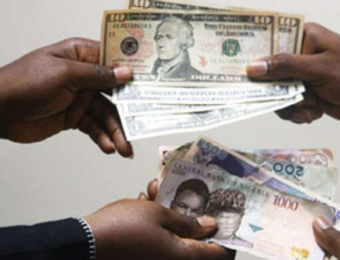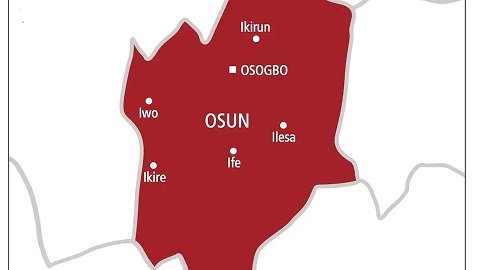[ad_1]
IN a move to arrest further plunge of the Nigerian currency, the Naira, against other currencies, particularly the dollar, operatives of the Economic and Financial Crimes Commission (EFCC) on Tuesday raided the Wuse Zone 4 area of the Federal Capital Territory (FCT), where most Bureaux de Change (BDCs) operate in Abuja.
The naira had last Saturday reached the N800 mark against the dollar and further plummeted to between N825 and N830 on Tuesday.
The country’s currency is experiencing a free fall against the dollar less than a week after the Central Bank of Nigeria (CBN) announced that it was going to redesign and re-issue N200, N500 and N1,000 as part of measures notes to curb inflation, kidnapping, among others.
Following the apex bank’s announcement, EFCC warned BDC operators to be wary of currency hoarders who may want to utilise the opportunity to offload the currencies they illegally stashed away.
Operatives of the anti-graft agency stormed Wuse Zone 4 on Tuesday in an operation sources said was aimed at arresting further depreciation of the naira at the black market. It was learnt that the EFCC operatives blocked the road leading to Zone 4 plaza, chased people away and arrested some BDC operators.
The development, according to some BDC operators, led them to hurriedly close for business and turned down customers who had wanted to do business with them.
An operator, who pleaded not to be named, told Nigerian Tribune that between Monday and Tuesday, the naira depreciated between N30 and N40, saying that the EFCC might have thought the forex traders were responsible for the depreciation and that the raid would prevent naira’s further fall.
According to him, “The Central Bank (CBN) early this year stopped selling forex to BDC operators at a time the dollar was exchanging between N560 and N570. They thought we were responsible for the naira fall. Their thinking was that if they stop selling to us, it would force the rate to crash.
“However, the naira keeps falling despite this. Today’s raid by EFCC was the second this year. They did same thing sometime in August or so.”
The operator noted that many factors combined to keep the naira plunging at the parallel market.
“Many factors are responsible for the high naira/ dollar exchange rate. One of such is the CBN stoppage of selling forex to BDC operators. Another is the difficulty encountered by people in accessing dollars from banks.
“The new policy of redesigning and re-issuing naira denominations in a limited time is causing people to convert their naira to dollar. Those who have money now use it to buy dollar at all cost thinking the naira might get to N1,000 per dollar,” the operator told Nigerian Tribune.
Another operator, who also spoke on condition of anonymity, disclosed that forex traders arrested by EFCC were later granted bail, lamenting that they were arrested for what was not their fault.
EFCC spokesman, Wilson Uwujaren, confirmed Tuesday’s operation by the anti-corruption commission, stating in a terse text message that, “Confirmed. There was an operation there.”
He, however, did not give any reasons for the raid or whether any arrests were made in the operation. EFCC chairman, Abdulrasheed Bawa, had on Wednesday, August 17 disclosed that the intervention of the anti-graft agency in the free fall of the naira against the dollar had then led to a significant appreciation of the Nigerian currency.
Bawa said this at a time the naira reached N710 against the dollar, saying that EFCC was not relenting in its efforts to check harmful speculative activities in the financial sector. According to him, it was in Nigerians’ collective interest to have a national currency which value was not subject to the whims of ‘crooked speculators.’
In his words, Bawa said, “One achievement which most of you may not easily recognise is the impact which EFCC’s intervention in the forex market has had on the value of the Naira.
inst the dollar in the parallel market and we are not relenting in our efforts to check harmful speculative activities in the sector.
“It is in our collective interest to have a national currency whose value is not subject to the whims of crooked speculators.”
Meanwhile, unrelenting demand for dollar forced the exchange rate to over N825 to a dollar on Tuesday, Nigerian Tribune findings have revealed. Demand for the greenback soared after the CBN announced plan to redesign the local currency.
This has drastically weakened the value of the naira at the parallel market. Nigerian Tribune gathered that the greenback exchanged for N820/$ in Lagos and Ibadan on Tuesday, while the exchange rate in Abuja hovered around N830/$. Some parallel market operators who spoke with the Nigerian Tribune identified two factors as being responsible for the rise in demand for the greenback.
“Many people are going for dollar because they believe it is better as a store of value. They want a currency that is fairly stable so that inflation will not make mincemeat of their money,” a parallel market operator who pleaded anonymity told the Nigerian Tribune.
“Unfortunately,” he added, “the more dollar that is mopped up by those who want to use it as a means of conserving their money, the more the pressure on naira because nobody saves dollar in the banks now since the banks are reluctant to make the currency available when depositors need their money.”
The second reason advanced by the operators is the need to beat the CBN at its game.
According to the operators, some people believe that taking their stored up naira to the bank for deposit would be tantamount to walking into a trap.
“So, they look for every means to convert the hoarded naira to dollar or any other foreign currency.”
[ad_2]








